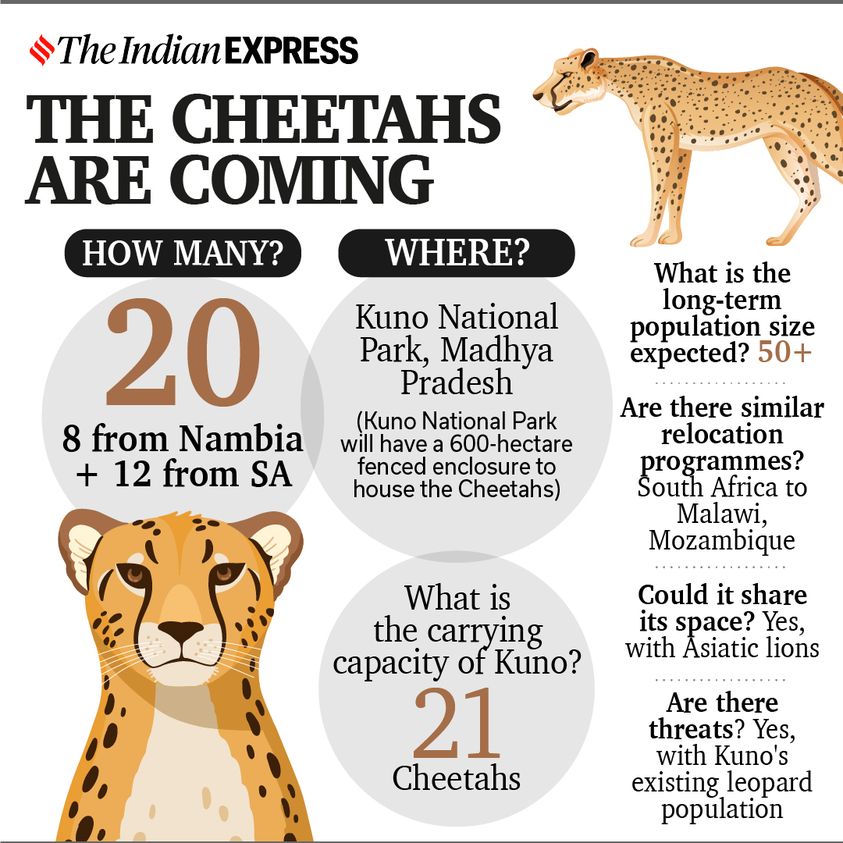Ahmedabad
(Head Office)Address : 506, 3rd EYE THREE (III), Opp. Induben Khakhrawala, Girish Cold Drink Cross Road, CG Road, Navrangpura, Ahmedabad, 380009.
Mobile : 8469231587 / 9586028957
Telephone : 079-40098991
E-mail: dics.upsc@gmail.com

Cheetah Reintroduction Project
News: India will release cheetahs from South Africa and Namibia into the wild at Kuno Palpur in Sheopur district of Madhya Pradesh, possibly by the end of this year. Initially, there will be 12 cheetahs from South Africa and eight from Namibia. More would follow in subsequent years.
About:
• The project to translocate cheetahs from Africa to India is being implemented by the environment ministry with the help of the Wildlife Institute of India.
• The Supreme Court had appointed an expert panel, which approved Kuno Palpur as the possible location for cheetah relocation.
Why reintroduction right now?
• ‘Reintroduction’ of a species means releasing it in an area where it is capable of surviving.
• Reintroductions of large carnivores have increasingly been recognised as a strategy to conserve threatened species and restore ecosystem functions.
• The cheetah is the only large carnivore that has been wiped out completely, mainly by over-hunting in India in historical times.
• India now has the economic ability to consider restoring its lost natural heritage for ethical as well as ecological reasons.
More facts about Cheetah:
• The cheetah, Acinonyx jubatus, is one of the oldest of the big cat species, with ancestors that can be traced back more than five million years to the Miocene era.
• The cheetah is also the world’s fastest land mammal.
• African Cheetah is listed as vulnerable in IUCN red listed species.
• The country’s last spotted feline died in Chhattisgarh in 1947. Later, the cheetah which is the fastest land animal was declared extinct in India in 1952.
• The Asiatic cheetah is classified as a ‘critically endangered’ species by the IUCN Red List, and is believed to survive only in Iran.
Why did they become extinct?
• Man’s interference is the primary reason. Issues such as human-wildlife conflict, loss of habitat and loss of prey, and illegal trafficking, have decimated their numbers.
• The advent of climate change and growing human populations have only made these problems worse.
• With less available land for wildlife, species that require vast home range like the cheetah are placed in competition with other animals and humans, all fighting over less space.

Address : 506, 3rd EYE THREE (III), Opp. Induben Khakhrawala, Girish Cold Drink Cross Road, CG Road, Navrangpura, Ahmedabad, 380009.
Mobile : 8469231587 / 9586028957
Telephone : 079-40098991
E-mail: dics.upsc@gmail.com
Address: A-306, The Landmark, Urjanagar-1, Opp. Spicy Street, Kudasan – Por Road, Kudasan, Gandhinagar – 382421
Mobile : 9723832444 / 9723932444
E-mail: dics.gnagar@gmail.com
Address: 2nd Floor, 9 Shivali Society, L&T Circle, opp. Ratri Bazar, Karelibaugh, Vadodara, 390018
Mobile : 9725692037 / 9725692054
E-mail: dics.vadodara@gmail.com
Address: 403, Raj Victoria, Opp. Pal Walkway, Near Galaxy Circle, Pal, Surat-394510
Mobile : 8401031583 / 8401031587
E-mail: dics.surat@gmail.com
Address: 303,305 K 158 Complex Above Magson, Sindhubhavan Road Ahmedabad-380059
Mobile : 9974751177 / 8469231587
E-mail: dicssbr@gmail.com
Address: 57/17, 2nd Floor, Old Rajinder Nagar Market, Bada Bazaar Marg, Delhi-60
Mobile : 9104830862 / 9104830865
E-mail: dics.newdelhi@gmail.com